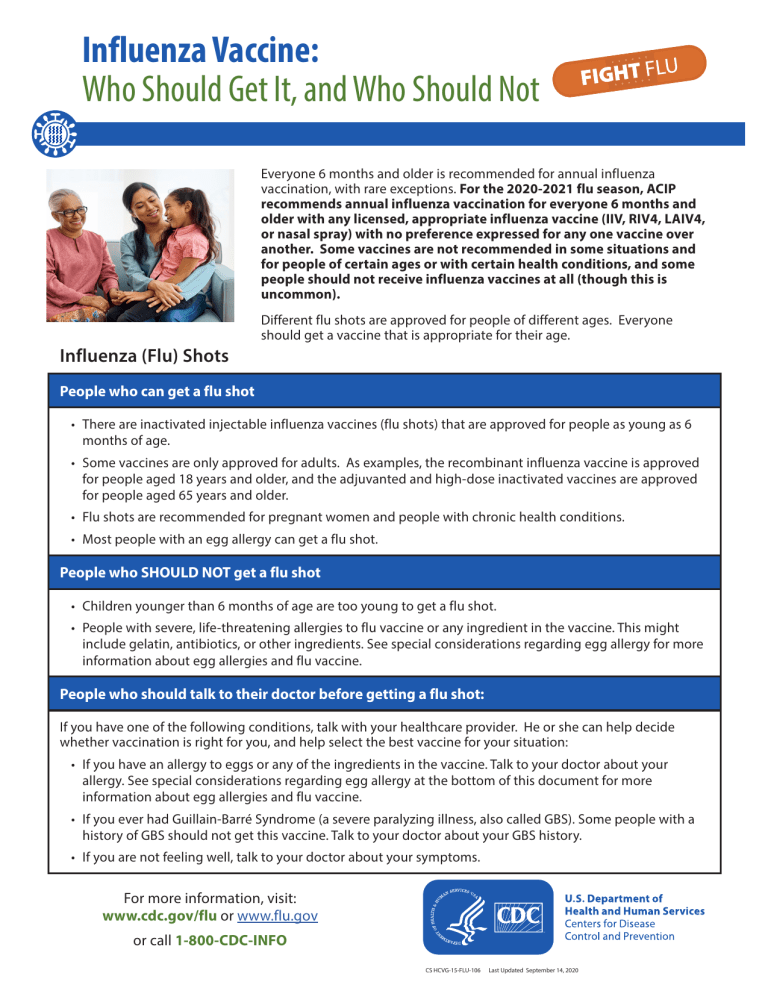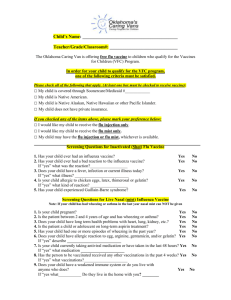Influenza Vaccine Guide: Who Should Get Vaccinated?
advertisement

Influenza Vaccine: Who Should Get It, and Who Should Not Everyone 6 months and older is recommended for annual influenza vaccination, with rare exceptions. For the 2020-2021 flu season, ACIP recommends annual influenza vaccination for everyone 6 months and older with any licensed, appropriate influenza vaccine (IIV, RIV4, LAIV4, or nasal spray) with no preference expressed for any one vaccine over another. Some vaccines are not recommended in some situations and for people of certain ages or with certain health conditions, and some people should not receive influenza vaccines at all (though this is uncommon). Different flu shots are approved for people of different ages. Everyone should get a vaccine that is appropriate for their age. Influenza (Flu) Shots People who can get a flu shot • There are inactivated injectable influenza vaccines (flu shots) that are approved for people as young as 6 months of age. • Some vaccines are only approved for adults. As examples, the recombinant influenza vaccine is approved for people aged 18 years and older, and the adjuvanted and high-dose inactivated vaccines are approved for people aged 65 years and older. • Flu shots are recommended for pregnant women and people with chronic health conditions. • Most people with an egg allergy can get a flu shot. People who SHOULD NOT get a flu shot • Children younger than 6 months of age are too young to get a flu shot. • People with severe, life-threatening allergies to flu vaccine or any ingredient in the vaccine. This might include gelatin, antibiotics, or other ingredients. See special considerations regarding egg allergy for more information about egg allergies and flu vaccine. People who should talk to their doctor before getting a flu shot: If you have one of the following conditions, talk with your healthcare provider. He or she can help decide whether vaccination is right for you, and help select the best vaccine for your situation: • If you have an allergy to eggs or any of the ingredients in the vaccine. Talk to your doctor about your allergy. See special considerations regarding egg allergy at the bottom of this document for more information about egg allergies and flu vaccine. • If you ever had Guillain-Barré Syndrome (a severe paralyzing illness, also called GBS). Some people with a history of GBS should not get this vaccine. Talk to your doctor about your GBS history. • If you are not feeling well, talk to your doctor about your symptoms. For more information, visit: www.cdc.gov/flu or www.flu.gov or call 1-800-CDC-INFO CS HCVG-15-FLU-106 Last Updated September 14, 2020 Nasal Spray Flu Vaccine: People who can get a nasal spray flu vaccine: Nasal spray vaccine is approved for use healthy non-pregnant individuals, 2 years through 49 years of age. People who SHOULD NOT get a nasal spray vaccine: • Children younger than 2 years. • Adults 50 years and older. • Pregnant women. • People with severe, life-threatening allergies to flu vaccine or any ingredient in the vaccine. • Children 2 years through 17 years of age who are receiving aspirin- or salicylate-containing medications. • People with weakened immune systems (immunosuppression). • Children 2 years through 4 years who have asthma or who have had a history of wheezing in the past 12 months. • People who have taken influenza antiviral drugs within the previous 48 hours. • People who care for severely immunocompromised persons who require a protected environment (or otherwise avoid contact with those persons for 7 days after getting a nasal spray vaccine). People who should talk to their healthcare provider before getting a nasal spray vaccine: If you have one of the following conditions, talk with your healthcare provider. He or she can help decide whether vaccination is right for you, and select the best vaccine for your situation: • People with asthma aged 5 years and older. • People with other underlying medical conditions that can put them at higher risk of serious flu complications. These include conditions such as chronic lung diseases, heart disease (except isolated hypertension), kidney disease, liver disorders, neurologic and neuromuscular disorders, blood disorders, or metabolic disorders (such as diabetes). • People with moderate or severe acute illness with or without fever. • People with Guillain-Barré Syndrome after a previous dose of influenza vaccine. Special Consideration Regarding Egg Allergy People with egg allergies can receive any licensed, recommended age-appropriate influenza vaccine (IIV, RIV4, or LAIV4) that is otherwise appropriate. People who have a history of severe egg allergy (those who have had any symptom other than hives after exposure to egg) should be vaccinated in a medical setting, supervised by a health care provider who is able to recognize and manage severe allergic reactions. Two completely egg-free (ovalbuminfree) flu vaccine options are available: quadrivalent recombinant vaccine and quadrivalent cell-based vaccine. For more information, visit: www.cdc.gov/flu or call 1-800-CDC-INFO

